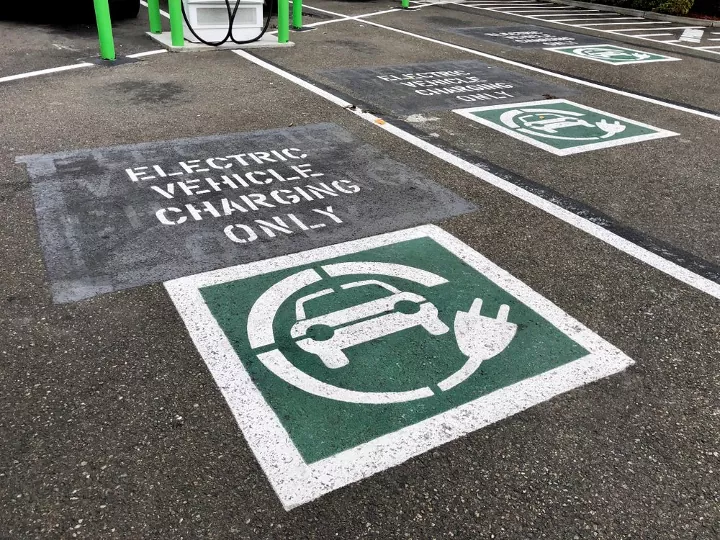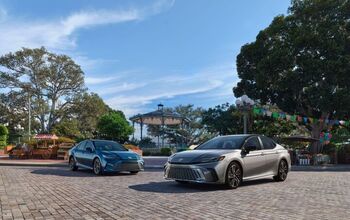Survey Shows Auto Dealers Still Annoyed With Biden EV Strategy

A recent survey, conducted by Automotive News, has indicated that automotive dealerships are still broadly dissatisfied with the Biden administration’s strategy to force the United States to pivot toward all-electric vehicles. According to the 2024 Dealer Outlook Survey, 83 percent of respondents said the government was pushing the transition toward EVs too quickly and mucking up the auto market.
The survey incorporated answers from 208 dealers and dealership managers and the majority agreed that the Biden administration had negatively affected their businesses in 2023. Roughly 55 percent also agreed that having EVs on the lot were actually generating negative interest in the lineup.
"Our roads and electric grid, let alone consumers, just aren't ready as fast as the current administration wants," explained one respondent.
Others likewise said that it should be the market driving EV sales, not pressure from the government.
From Automotive News:
A top concern was the EPA's proposed limits on vehicle tailpipe pollution for 2027-32 model-year cars and light trucks — a regulatory move that, if finalized, could result in battery-electric vehicles making up two-thirds of new-vehicle sales by 2032, according to the agency's projections.
Thousands of dealerships have urged President Joe Biden to reconsider the proposal — which could be finalized as soon as March — arguing it would mandate an unrealistic shift to solely battery-powered vehicles before the market and infrastructure are ready.
"Electric vehicles are exciting. They're definitely overall a good impact for our customers and for the environment, but it's moving too fast," said Michael Lucki, general manager of Riverhead Mazda in New York. "It should be driven by consumer demand, and consumer demand isn't there yet."
The collective dismay was probably best reflected in the question: “Is the Biden administration pushing the industry to move too fast on EVs?”
That query saw an overwhelming majority (83 percent) say yes. Only 8 percent of respondents said no, with 9 percent claiming they were unsure. About half of all dealerships also said they never bothered to register with the IRS to more easily facilitate EV tax credit exchanges. However, about half of those said they at least planned to in the future so customers could get their government refund immediately.
While the Biden administration has a stated goal of seeing half of all new vehicle sales by electric by 2030, it’s technically prohibited from issuing formal mandates requiring what people can use their money to buy. However, it can encourage federal regulators to implement policies so rigid that the industry is required to build EVs in greater numbers and that has been its preferred tactic.
As you undoubtedly know, the automotive sector has spent the last few years patting itself on the back for going along with the scheme and similar programs implemented in Europe. Electric automobiles have, for whatever reason, been framed as a moral good by both industrial and government actors. But the public has remained broadly hesitant to climb aboard the bandwagon as the downsides of EV manufacturing became more apparent.
The industry has likewise had trouble fielding electric vehicles with broad appeal. Luxury-minded electrics are simply too expensive for most people to afford and the more pedestrian models have been seen in the news for battery fires and botched product launches. Some of that is undoubtedly the result of the media landscape trying to draw in eyes. But it’s being reflected in slowing sales, as the electrified segment looks to be approaching market saturation.
That said, sales volumes haven't been great in general and quality control looks to have gone down across the board since 2019. Combustion and electrified vehicles have both seen a drop in consumer satisfaction. Meanwhile, inflationary pressures, caused by excessive government spending and plain-old corporate greed, are forcing average buyers downmarket.
As for dealers, there’s some amount of disagreement as to what’s holding EVs back. Some have argued it’s simply a lack of infrastructure, while others have claimed battery driven vehicles simply don’t work as well for the typical customer. Many stores also don’t want to shell out large sums to refit their facilities in the manner some automakers claim would be mandatory if they want proper EV allocation.
Rising MSRPs were also a concern, with many noting EVs tend to trade at prices far higher than their combustion-driven counterparts and are likewise worse at holding their resale value. That issue was exacerbated by provisions (e.g. Section 30D) issued by the federal government designed to help localize electric vehicle production and ensure wealthy shoppers (who tend to buy more EVs) weren’t being overly advantaged. There are ironically fewer vehicles that actually qualify for government subsidies now than when the U.S. still used production quotas.
"EVs are definitely not a want of our guests today. Who's going to pay that kind of money for that type of vehicle when the infrastructure isn't available?" stated Mike Aus, dealer principal of Durango Motor, which sells Ford, Lincoln, Kia and Toyota vehicles out of Colorado. "Until the prices of them come in line with normalcy, they're going to continue to sit there."
[Image: ZikG/Shutterstock]
Become a TTAC insider. Get the latest news, features, TTAC takes, and everything else that gets to the truth about cars first by subscribing to our newsletter.

A staunch consumer advocate tracking industry trends and regulation. Before joining TTAC, Matt spent a decade working for marketing and research firms based in NYC. Clients included several of the world’s largest automakers, global tire brands, and aftermarket part suppliers. Dissatisfied with the corporate world and resentful of having to wear suits everyday, he pivoted to writing about cars. Since then, that man has become an ardent supporter of the right-to-repair movement, been interviewed on the auto industry by national radio broadcasts, driven more rental cars than anyone ever should, participated in amateur rallying events, and received the requisite minimum training as sanctioned by the SCCA. Handy with a wrench, Matt grew up surrounded by Detroit auto workers and managed to get a pizza delivery job before he was legally eligible. He later found himself driving box trucks through Manhattan, guaranteeing future sympathy for actual truckers. He continues to conduct research pertaining to the automotive sector as an independent contractor and has since moved back to his native Michigan, closer to where the cars are born. A contrarian, Matt claims to prefer understeer — stating that front and all-wheel drive vehicles cater best to his driving style.
More by Matt Posky
Latest Car Reviews
Read moreLatest Product Reviews
Read moreRecent Comments
- Jalop1991 In a manner similar to PHEV being the correct answer, I declare RPVs to be the correct answer here.We're doing it with certain aircraft; why not with cars on the ground, using hardware and tools like Telsa's "FSD" or GM's "SuperCruise" as the base?Take the local Uber driver out of the car, and put him in a professional centralized environment from where he drives me around. The system and the individual car can have awareness as well as gates, but he's responsible for the driving.Put the tech into my car, and let me buy it as needed. I need someone else to drive me home; hit the button and voila, I've hired a driver for the moment. I don't want to drive 11 hours to my vacation spot; hire the remote pilot for that. When I get there, I have my car and he's still at his normal location, piloting cars for other people.The system would allow for driver rest period, like what's required for truckers, so I might end up with multiple people driving me to the coast. I don't care. And they don't have to be physically with me, therefore they can be way cheaper.Charge taxi-type per-mile rates. For long drives, offer per-trip rates. Offer subscriptions, including miles/hours. Whatever.(And for grins, dress the remote pilots all as Johnnie.)Start this out with big rigs. Take the trucker away from the long haul driving, and let him be there for emergencies and the short haul parts of the trip.And in a manner similar to PHEVs being discredited, I fully expect to be razzed for this brilliant idea (not unlike how Alan Kay wasn't recognized until many many years later for his Dynabook vision).
- B-BodyBuick84 Not afraid of AV's as I highly doubt they will ever be %100 viable for our roads. Stop-and-go downtown city or rush hour highway traffic? I can see that, but otherwise there's simply too many variables. Bad weather conditions, faded road lines or markings, reflective surfaces with glare, etc. There's also the issue of cultural norms. About a decade ago there was actually an online test called 'The Morality Machine' one could do online where you were in control of an AV and choose what action to take when a crash was inevitable. I think something like 2.5 million people across the world participated? For example, do you hit and most likely kill the elderly couple strolling across the crosswalk or crash the vehicle into a cement barrier and almost certainly cause the death of the vehicle occupants? What if it's a parent and child? In N. America 98% of people choose to hit the elderly couple and save themselves while in Asia, the exact opposite happened where 98% choose to hit the parent and child. Why? Cultural differences. Asia puts a lot of emphasis on respecting their elderly while N. America has a culture of 'save/ protect the children'. Are these AV's going to respect that culture? Is a VW Jetta or Buick Envision AV going to have different programming depending on whether it's sold in Canada or Taiwan? how's that going to effect legislation and legal battles when a crash inevitibly does happen? These are the true barriers to mass AV adoption, and in the 10 years since that test came out, there has been zero answers or progress on this matter. So no, I'm not afraid of AV's simply because with the exception of a few specific situations, most avenues are going to prove to be a dead-end for automakers.
- Mike Bradley Autonomous cars were developed in Silicon Valley. For new products there, the standard business plan is to put a barely-functioning product on the market right away and wait for the early-adopter customers to find the flaws. That's exactly what's happened. Detroit's plan is pretty much the opposite, but Detroit isn't developing this product. That's why dealers, for instance, haven't been trained in the cars.
- Dartman https://apnews.com/article/artificial-intelligence-fighter-jets-air-force-6a1100c96a73ca9b7f41cbd6a2753fdaAutonomous/Ai is here now. The question is implementation and acceptance.
- FreedMike If Dodge were smart - and I don't think they are - they'd spend their money refreshing and reworking the Durango (which I think is entering model year 3,221), versus going down the same "stuff 'em full of motor and give 'em cool new paint options" path. That's the approach they used with the Charger and Challenger, and both those models are dead. The Durango is still a strong product in a strong market; why not keep it fresher?


































Comments
Join the conversation
"They should first electrify that border wall."
I kinda got a chuckle out of that meme.
if it were up to the luddites we'd still ;;;
have leaded gas
no seat belt laws
smoke on airplanes
don't let women vote
as it is dealerships and 'top salespeople' are the literal scum of the earth so NFG, go cry all you want dealers ...